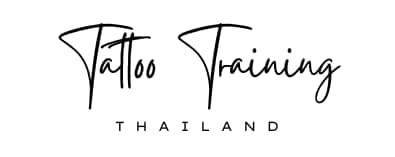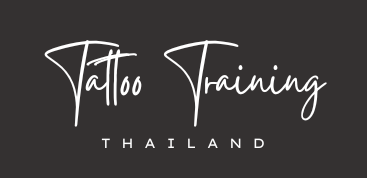
20 Sep “You probably know that feeling when things start to fall into place. When your path becomes clearer, and everything you’ve done before makes sense,” interview with tattoo artist Evelina Jurković
From a girly, pink studio in a small town called Banská Bystrica in Slovakia (where you can’t order takeaway after 9pm), tattoo artist Evelina Jurković @eweltattoo creates her delicate fine-line tattoos. Here she tells us all about how she brought the style over to her country, her struggles with an eating disorder, the importance of normalising all bodies in tattooing, how freediving changed her life and her mastectomy project…
When did you first fall in love with tattoos?
I don’t have a specific moment. But you probably know that feeling when things start to fall into place. When your path becomes clearer every day, and everything you’ve done before makes sense.
As a child, I grew up in an environment where there were always drawings spread out, unfinished paintings. My mom is an artist; she taught drawing at a school and often prepared for art competitions or worked on projects for theatre, either in her studio or at our kitchen table late into the night. That influences you as a child. I attended art school for both my secondary and higher education, and when I had the opportunity to try tattooing, I thought that maybe this would be my path – at least for now.
How long have you been tattooing for and how did you start?
Learning to tattoo was like learning anything else – completely terrible! I learned to tattoo mostly on my own, without much outside help. I did attend a tattoo course as it’s mandatory in Slovakia if you want to have your own tattooing business one day. But I learnt a very small percentage of the necessary information. When you leave, you have a certificate, but if you plan to work independently, you quickly realise that you know practically nothing. You can’t learn to tattoo in three days. So, in my opinion, such short courses make absolutely no sense.
Learning to tattoo on artificial skin is one thing, but a much bigger challenge is when you start working on real skin and with real people. It’s extremely stressful because any mistake is irreversible, and you also realise that the person will carry it with them for the rest of their life.
I started by tattooing friends, but when I began working in my own studio, I would often dream about the design I was going to tattoo the next day. I’ve been tattooing for over 10 years now, but I still feel a deep respect for my work.
How did you develop your style to what it is today?
I was the first to start tattooing fine-line in Slovakia. I saw many beautiful tattoos on Pinterest and wanted something similar on my own body, but every studio I went to told me it couldn’t be done or that it would have to be thicker. So I started thinking about how it’s possible. So I bought the thinnest needles available on the market and started experimenting with what could be done.
What’s your studio like? What can people expect when they get tattooed there?
My studio is located in central Slovakia in a town called Banská Bystrica. It’s a historic town with a small population, where there’s just one shopping mall and you can’t order food delivery after 9pm!
In my studio, I place a huge emphasis on my client’s privacy — I work alone with the client, I don’t have multiple tattoo artists or chairs in the space. My studio has quite a girly vibe —light colours, pink decorations, scented candles, large bright spaces with high ceilings, and paintings in golden frames on the walls.
Do you have a tattoo experience that stands out in your mind?
I have several. I remember a lady who had pigment spots on her arms and legs and didn’t want to go on vacations because she felt like everyone was staring at her. After getting them tattooed over, she started wearing dresses and swimsuits.
I often have women with eating disorders who get motivational phrases tattooed. It’s always more personal for me because I’ve been struggling with an eating disorder for many years. That’s also why I started talking about the importance of normalising normal bodies — normalising scars, stretch marks, postpartum bodies, bodies that have had children.
If we didn’t censor certain types of bodies and didn’t favour one “perfect” body type according to the current trend, we would live in a much healthier society. We wouldn’t have 13-year-old girls in therapy for anorexia or mothers who refuse to go to the swimming pool because their bodies changed after childbirth. And we wouldn’t have bullying in schools and workplaces, either.
Now for your own tattoos, tell us about them. Do your they help you feel differently about your body?
No. I got my tattoos at a very young age, which was, of course, a mistake. If I could erase my tattoos, most of them would be gone. But I do love the inscriptions on my arms, which I got as an adult, and they have a meaning for me beyond just the visual.
On my left arm, I have the words “focus” and “move.” On my right arm, I have “no limit.” “Focus” because it’s incredibly important in life to focus on one thing if you want to be successful—not to stray, not to skip, not to doubt it. “Move” because if you’re not happy, you need to move. And “move” because if you don’t stay in motion, you won’t grow as a person. “No limit” is a reference to a film of the same name that led me to a sport that completely changed the direction of my life and mindset. Limits don’t exist — only in our minds.
Can you tell us more about the sport that changed your life?
In the beginning, it was definitely running, specifically long-distance running. Running, after a certain point, becomes more about your mindset because you’re battling not just your body but your mind. However, after years, I needed a break.
In 2017, I discovered freediving, a sport that seemed a bit crazy yet beautiful. I accidentally watched the film No Limit. After that, I found my coach, Martin Ruman, and started working on myself. And I couldn’t have done anything better with my life.
What does freediving make you feel like?
It’s very hard to describe or even talk about, and I think every diver would agree. Freediving gives you space to dive deep into yourself, to learn to trust yourself, to be absolutely present, and focus solely on what you’re doing. No one else exists. Nothing else matters. When you go deeper, you’re completely alone. You can only rely on yourself. You can’t panic. You can’t breathe.
At the same time, you face the question of death, which you cannot avoid. You realise that what you’re doing could kill you if you misjudge your abilities or make a mistake. Before every dive, you evaluate how far you can go today and still be able to return, and you understand that how your dive will turn out depends on your mindset. You also realise that your ego is your greatest enemy in this sport. It can put you in danger and, in the worst case, kill you. It’s an amazing sport — you should try it!
How do you usually work with your clients? Do you mostly do custom work or do you create flash, too?
I create designs with clients together in Photoshop. I think good communication, understanding what the person who will wear it for the rest of their life wants, is absolutely the top priority. The person you’re working with is always the top priority—only then comes your artistic vision.
Can you tell us about your latest mastectomy project? How can clients get involved?
Yes, I’d love to. I believe that if you want to live in a better world, not be surrounded by hate and pain, you have to start with yourself. You don’t have to donate millions to charity, but you can start with small gestures and change people, nature, the world for the better in small ways. People who only complain and do nothing to make humanity or their close surroundings better are losers to me. You can donate clothes to charity, you can teach someone a foreign language for free, or as a tattoo artist, you can change someone’s life by covering a scar with a tattoo for free. If we stop believing that someone will help us when we need it, if we stop believing that good people still exist, and if we stop helping others selflessly, we will find ourselves in a very dark place as humanity.
If you’d like a mastectomy tattoo or scar cover up simply email me with your story – ewelofficial@gmail.com.
You love to travel! Where have you been, and where’s next? Have you got any tattoos from your travels?
Next, my husband and I are planning to visit Dahab. I’d like to stay there for at least a month or two, depending on how time and finances allow. I believe that this place is absolutely extraordinary, and I’ll find at least one answer to the life questions I’m currently struggling with. And of course, like for most freedivers, there’s one small attraction there — the Blue Hole. A 100-meter sinkhole just a few meters from the shore.
Are you planning any guest spots? If so, where and how do we book in?
I love guest spots. I’m currently looking for a studio in Bangkok or elsewhere in Asia, but I’m pretty much open to anything. We’re considering moving away from Slovakia and are looking for a place on Earth where we can say, “it feels like home.” I’ve never felt at home anywhere, and I’ve never known exactly where I want to live or where I belong, what culture or country I’m closest to. So I want to give myself time to find the answer to this question. So if you have a studio and want to meet me, don’t hesitate to write.
Make sure to follow Evelina on Instagram for more tattoos and to book yours.
We’re always talking to amazing tattoo artists, check out our latest interviews.
The post “You probably know that feeling when things start to fall into place. When your path becomes clearer, and everything you’ve done before makes sense,” interview with tattoo artist Evelina Jurković appeared first on Things&Ink.



No Comments